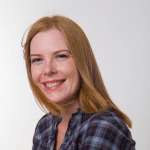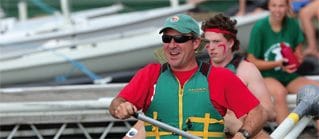Uncategorized
5 min Read
Zero ego: A teacher shows his students how to ‘fail forward’

January 30, 2018
Uncategorized
5 min Read

January 30, 2018

So sure he wanted to be a veterinarian, 10-year-old Pete O’Grady bought a sheep with his brother and a friend. It wasn’t long before they had more sheep, which they housed at his friend’s grandfather’s old barn in their rural area north of Kingston, Ont.
“I was getting tail ringers and needle kits and books about how to look after sheep,” says O’Grady. “And I would volunteer with our vet.”
But then he went to a camp program called Outreach. “They had a huge impact on me,” says O’Grady. He eventually worked at the camp, and once he left high school, his boyhood career plans had changed. Instead, he wanted to attend Queen’s University, specializing in physical education and biology – and teacher’s college.
This plan stuck.
O’Grady pursued his dream by working in outdoor education in the summers and on weekends, including Mattawa Canoe Centre and a stint in Smithers, British Columbia.
The teaching career began in the public education system, first in Kingston, later in northern Ontario, where O’Grady worked with a provincial government outdoor education program focussed on fostering life skills for high school students.
But 17 years ago, his journey led him to an independent school. O’Grady’s wife, Ally – also a teacher – had started working at Lakefield College School, a day and boarding school in Lakefield, Ont. A year later, he was there, too. Today, O’Grady is teacher of outdoor education, teacher advisor to grade 12 students, and director of the school’s student leadership program.
It’s a program he created and founded. It strives to grow the leadership skills, character and values of kids in the 365-strong student body. Each year centres on a different theme. In grade nine, students work on developing confidence through finding out everything the school offers, for example, and advocating for themselves. In grade 10, the emphasis is put on learning how to be part of the local community, including outreach and work with agencies and charities.
Citizenship is at the heart of the program in grade 11. “It’s a lot of just learning to be with people, and that diversity is reality, diversity is strength,” says O’Grady.
“How do you leverage that? That conflict is real, conflict is bad, conflict is good. We navigate that, all the way up to a global citizenship element. We joke a little bit about ‘the Lakefield bubble,’ ’cause we are at the outskirts of a little town. How do we start coming back into the global community, to learn a bit more about each other?”
The program culminates in the graduation year, where O’Grady says leadership is encouraged, as well as “being aware of personal strengths, and being okay with the type of leader you are.” Part of this grade 12 year is a class in which a group of students operate similar to a student council. O’Grady says these kids are responsible for running more than 100 spirit events during the school year.
Recent events organized by the class were a Hogwart dinner and Gladiator Day.
“I tell them, ‘You’re not going to write a 10-page essay in this class and wait three weeks to get your result. Your project will be 220 faces looking at you, ready to start some event or activity.
“They do an incredible amount of work for the school, and support the bigger grad class,” says O’Grady. “It’s awesome.”
“I don’t micro-manage. I work with the kids, I support them,” he says. “And if we fail, we fail. Figure out why and move on.”
Alex Westcott was in O’Grady’s school life class last year. She says he showed the group how to ‘fail forward’ – learning from mistakes and building resilience.
“He has zero ego. He puts himself out there in the most honest way. It’s not just someone preaching how someone should be a leader or whatever.”
“He kind of embodies personal resilience. So when things don’t work out, say an event or whatever, he completely takes the responsibility for it,” says Westcott. “That’s key in the sense that not everything goes the way that you plan it to.”
Westcott says that in the class’s improvisation activities, people are put on the spot in a supportive way. She says this teacher often goes first to break the ice.
John Runza is assistant head of school life at LCS. He says students have a deep affection for O’Grady. “He’s kind and grounded and family-oriented,“ says Runza.
“He treats his students like he would his own children – with respect, but still holds certain expectations in a kind way.”
O’Grady teaches all grades in outdoor education. Students experience canoeing, Nordic skiing, snowshoeing, and river rescue. Camp craft cooking and winter camping are also included in the various courses.
“We have a high elements and low elements ropes course. We do whitewater and flat water canoeing,” says O’Grady. “And it’s all within the class.”
O’Grady says many things can be taught through outdoor education. Geography is a good case in point. “Spring is great for gradational processes. You have a map, a camp, it’s as simple as that. And find a hill, and there’s water moving on it.”
What’s O’Grady’s secret to connecting with his pupils? Seeing them as individuals.
“I see the person first,” says O’Grady. “It’s always the person. And that’s who I am, and it’s been important to me. I feel very, very lucky to have the role I have here.”